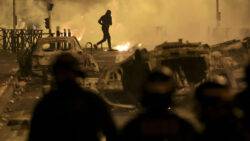Recent riots have cast a shadow over France’s beloved Bastille Day national holiday, which marks the start of the French revolution, with fireworks displays called off around the country, outraging some conservatives.
Fireworks sales have been banned over their use against security forces in riots which erupted at the end of June after police shot dead a teenager during a traffic stop, reviving anger over racism and police brutality.
France’s most intense urban violence in nearly two decades rocked the country for a week, with thousands of cars torched, public property destroyed, and over 3,700 rioters arrested, many of them minors.
The western Paris suburb of Nanterre, where 17-year-old Nahel M. was killed by police, is one of many municipalities to call off their annual Bastille Day fireworks displays for fear of further unrest.
“We can’t celebrate our national day because of hooligans, I believe things are much worse than people think,” David Lisnard, the head of the French Mayors’ Association (AMF) told broadcaster France Inter on Wednesday.
Lisnard, a member of the opposition conservative Republicans (LR) party, said the cancellations were “a sign of a very deep unease in French society”.
President Emmanuel Macron will celebrate Bastille Day, which marks the fall of the Bastille prison in 1789, seen as igniting the French Revolution, with ally Indian President Narendra Modi at the traditional central Paris military parade under heavy security.
The two leaders are also set to watch the main Paris fireworks display at the Eiffel Tower, which has been maintained, after nightfall on Friday.
‘Calm summer needed’
Interior Minister Gerald Darmanin said Wednesday that an “exceptional” 45,000 police would be deployed on the nights of July 13 and 14 — as many as at the height of the riots.
“What we’re trying to avoid… is a resurgence of these violent episodes, through preventive measures as well as by an increased police presence on the streets,” Darmanin told reporters.
Police would be “specially equipped and organised” to face urban violence and backed up by specialist units, helicopters, drones and armoured vehicles, he added, while 34,000 firefighters would be on duty.
Darmanin also said Wednesday that a march against police violence, planned for Saturday, would not be authorised.
This also went for “any demonstration with a direct link to the riots” until Saturday, he said.
Over 150,000 heavy-duty fireworks similar to those shot at police and buildings during the riots have been seized in recent days, Darmanin said, many of them imported from EU countries such as Spain and Poland.
The move to ban the sale of fireworks over the weekend was challenged by businesses selling them, who asked the State Council — a court dealing with citizens’ complaints against authorities — to overturn the decision. A ruling is due by Thursday.
Buses and trams, meanwhile will stop running at 10:00 pm on both nights, he added, although metro lines and suburban trains are to continue until late.
Macron’s office said Wednesday that he would not be making a televised address as planned on July 14, when he had hoped to sum up the achievements of a 100-day reset after the passage of a bitterly contested pension reform.
“If violence flares up again this summer, the effects will be very negative… he needs a calm summer to get back to reforms” from September, political scientist Bruno Cautres told AFP at the weekend.
‘Loss of confidence’
Marine Le Pen, leader of the far-right National Rally and Macron’s challenger in two presidential elections, slammed the decision by some towns to cancel July 14 festivities.
“Can you believe that in the great democracy of France, we are giving up on our national day because of the fear generated by potential violence or potential riots by some people?” she added, calling the move “an admission of a total loss of confidence in the state”.
She used her remarks in Beauvais, a town north of Paris, to criticise the cost of rebuilding burned-out public buildings and to suggest that the rioters pay for the damage, even if it took “the rest of their lives.”
Commenting on plans to fine underage rioters’ families, Prime Minister Elisabeth Borne said on Sunday that the government would “evolve the law… if the existing legal framework is insufficient.”
Prosecutors meanwhile said Wednesday that 12 people had been arrested in connection with an attack on a mayor’s home near Paris during the riots, when a car was rammed into the house, causing a fire.
(AFP)





